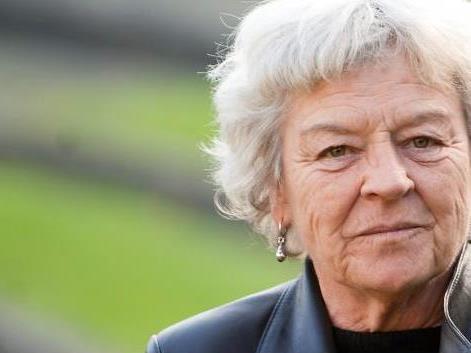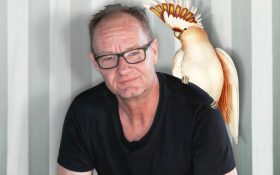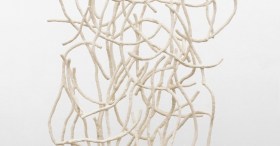Image via Labkultur
Last week (January 2015), ArtsHub published a report on Belgian festival director and curator Frie Leyson’s challenge to Australian theatre artists, Disturbing, not pleasing, should be art’s role.The reaction was so positive we decided to publish her entire speech.
I.
My whole professional life was and is dedicated to artists and their work. Love allows criticism. Therefore, I allow myself some questions and some critical reflection concerning artists, but also, and even more, their entourage – the structures and organisations around them, and artistic policies.
What follows might seem a bit too black and white. But, I’m not good at diplomacy, and I’m too old to try to please. I realise many organisations and structures do great work but I want to show where it hurts, not please.
Why the arts? Why do we need them so much? While we are all running around, busy doing things, the artists decide to stand still, to look closely at us and the societies we have constructed – at how we have organised ourselves. They look, analyse, reflect and criticise. And develop visions of what is and what could be. Their visions are often eye-openers, electro-shocks, heavy confrontations with ourselves. Mostly painfull.
But we need it. We are lucky that in Europe and here in Australia, we live in societies that invest in this, that support the artists for doing so, with public funding.
I always travel around the world trying to find out how younger generations see their, and by extrapolation ‘the’, world – how relevant this vision is for us, living elsewhere, how it can inspire us, make us question our way of seeing things, correct it or even radically change it, question the cliches we need so much in order to simplify our complex world. In short, how they can make us shift our perspective, by looking at this world through their eyes.
What fascinates me are these visions and the urgency of artists to share them with us, the audience. But also the courage the artist has to question their own art form and the languages they normally use. To find a new language to express what they so urgently have to express.
When these three elements come together, the personal vision, the specific artistic language and the generosity and the need to share with an audience, there are fireworks!!!!
II.
This respect and need for the artists’ views in our society has always dictated the way I work:
- The artist and her/his needs are always at the centre, rather than the one work I might find interesting. My way of working is determined by the artists and their specific needs. Meaning:
(1) A flexible team to adapt to the rhythm and needs of the artists
(2) Accompany, if possible, new work by producing or co-producing
(3) Leaving artists the choice of which discipline they choose to express:film, exhibition, installation, music, theatre… -
We all know that in the contemporary arts, the former labels for disciplines are no longer valid. The borders between them have become blurred.
- Travel into the world and see artists in their own biotope. Don’t make your program behind your desk (well, you can, but it will never be very exciting). It costs time and money, but it is a question of priorities (with the fee of one Bob Wilson production you can travel for a few years).
It takes time, except for the rare coups de foudre. Before deciding to work together with an artist, I have to see more than one work, discuss a lot to understand their standpoint, to feel the consistency in their position politically, socially, artistically, and to understand what their work means in their own context. The personality of the artist is more important to me than a single work. And then comes the question: can the work survive transplantation in a different context. Not every work is transplantable.
- I believe a lot in going for a parcours with an artist. For instance, after following him/her for some time, comes an invitation for an existing work that I have seen, as an introduction to the audience. At the same time, we engage as a producer or co-producer in a new production, offering, where needed, assistance at all levels: content and dramaturgical assistance, searching for co-productions, looking for collaborations, technical support and finding the right space for presentation. The new work, with all the risks of a creation, could be presented the year after. For an audience, it is interesting to see an artist evolve, grow…
- We know the great artists of today. The big names and the stars are traveling all over. Success guaranteed, box office happy, risks hardly existing. But the question is: who are the great artists for tomorrow? As theatre or festival directors, it is our responsability to offer young and beginning artists a platform, to see that new generations can develop.
But carefully: festivals and theatres often become killing machines, searching for the newest, the hottest, creating new hypes. Shooting artists up like rockets instead of giving them the time to grow. Standing, shining next to the artists when they make it, but often dropping them as soon as they fail.
- The audience: essential sparring partners for artists. They cannot do without each other: the artist, because they urgently want to share his/her ideas with the audience; and the audience that is hungry for inspiration, other views of our world. For me, it is still a mystery. When I’m at the entrance of a theatre and watch all these people coming over to see a show, I wonder: why do they come? What are they looking for here? Why are they not at home in their slippers with a nice glass of wine, watching tv? They invest so much to be there: financially, they have to buy tickets; organisationally, coming home early from work, picking up the babysitter, seeing that there is enough coke and chips for them, dressing up, rushing to the theatre, and, most of all, spending one or two hours listening and watching the artists. Spending their intellectual and emotional capacities all this time for this artist, means quite something.Just to say that I have a huge respect for the audience and, most of the time, we underestimate them. Thinking for them that, after a hard day’s work, they need something entertaining, something light. Mistake. It is not because I’m tired that my brain doesn’t function any more.
Often I hear organisers say “it is nice, but not for my audience”. Who is that audience? A monolithic block of people? And who are we to say what they want to see? Underestimating is an insult. Being demanding is a sign of respect.
I always define our role as programmers as a hyphen. The little sign between two words. The little sign that brings the artists and an interested and demanding audience together. A small but essential sign, for, without it, artists and audiences wouldn’t find each other.
III.
Where do we stand with the arts, with theatre, today?
- In times of right-wing nationalism, extremism, racism and intolerance.
- In times we let people, looking for a brighter future, deliberately drown in the ocean.
- In societies that are purely consumption oriented.
- In times we don’t know how to deal with our colonial past and rising independencies.
- In times everyone has to be a winner.
- In times western supremacy is no longer valid.
- In times we take down the borders but raise them soon again.
- In times where politicians understand creating fear is the most efficient weapon to keep us all under control. A permanent state of emergency.
- In times “they” know everything about everyone.
- In times directed by managers and bookkeepers.
- Etc etc etc
Where do we stand with the arts?
In Europe, I see the difference between art, culture and entertainment vanishing. I have a strong feeling, certainly after attending some of the meetings here, that the same is happening in Australia. But the three are completely different, have different missions, different needs and different logics.
We have built theatres and arts centres, and we created festivals to produce and present art works and to welcome audiences in the best possible conditions. But, during the years, most of these structures and organisations have become rusted and sclerosized. They became dinosaurs.
Originally meant to support the artists, they got organised very well, often too well, and so lost the needed flexibility to respond to the specific needs of specific works. The artists now have to follow the policy and the rules of the houses instead of the other way around.
We urgently have to reconsider the role of theatres and festivals, as instruments to facilitate and valorise artists again. And we need more flexible structures, production houses that can work tailor-made with artists.
While the civil society is searching for how to get organised in a different way at all levels, how to deal with transition, production, consumption, climate change, the failing capitalistic system, sustainability, and how to develop new models, we in the arts are far behind. We dont have the courage to rethink structures and systems apparently.
I see changes happening, but mostly in the periphery, with individual artists. Not enough in the bigger, more settled structures.
Why don’t we look for allies in the civil society to think together? And could science not be a valuable partner?
We created a culture of “pleasing”, that is now hijacking us.e want to please everybody: the audiences, the subsidisers, the sponsors, the press, the colleagues… a big mistake! Art should not please. On the contrary. Art has to show where it hurts in our societies, in our world. We urgently need the courage back to pick up this role of disturbers again.
IV.
In this pleasing culture, we are so kind to accept missions that are given to us but are not ours. Problems the political world cannot solve are put on our shoulders to deal with. Racism, social discrimination, failing education systems, intolerance…
Of course the arts have to deal with these issues, but we will never be able to solve these fundamental problems. And we don’t have to. We should have the courage to refuse these missions.
V.
Also, in this pleasing culture, we constantly adapt to who is addressing us. We answer in the different languages, in the different logics of our counterparts. Mistake again.
To the politicians we speak with political arguments, to subsidisers and sponsors we speak with financial, economic arguments and of huge audiences. To audiences we speak with entertaining arguments, with the press we speak with superlatives and exclusivity arguments. And with colleagues, we confirm each other.
We must urgently find our artistic language and artistic arguments again. Because everything of value is defenceless.
Audience numbers are important, good management is essential, good marketing and communication are obviously needed, financial management goes without discussion.
But the real argument to defend the arts is what happens in the heads and hearts of people who attend a theatre show. And this we cannot measure, we cannot prove.
The arts are elusive.
VI.
Consumerism has also infected the arts. A theatre ticket must guarantee top quality. So, to be safe, we present the confirmed artists, the sure-value, the stars.
And what with the next generation? What with unknown artists from far away? What with urgent but risky productions?
How can we make the audience a partner in adventure instead of a consumer?
How can we communicate with audiences that theatre is a living art form, every night created again and again. And fragile. That even the biggest artists also make work that is not fantastic.
We should valorise the risk, the adventure, the ephemeralness of theatre, the uniqueness of the experience, the temporary community that is created every evening again with the actors and the audience.
VII.
Internationalisation is obvious, a given thing, a must. I’m not going to develop this issue further – just some short reflections:
– We are not talking about the exotic or folkloristic. It is about artists from all over the world with strong visions, who can change our perspective on our world.
– International includes the very local. Only the local can be universal.
– International is more than Western. It includes Asia, Latin America, Africa…
– One more point, I realise that the presentation of non-Western art often reveals our perverse love for misery, war, hunger, suppression, illness, exploitation. We love it, at least when far away.
– And, finally, the West is not the centre of the world anymore. Western supremacy is no more. Happily. I dont see one new centre. I hope for a world with different centres.
VIII.
We have lost something very precious these last decades: our intuition.
Audiences come out of shows and say they don’t ‘understand’. How did we come that far? Art, and theatre, addresses our intellect, indeed. But not only that. We also look with our heart and with our belly: our intuition! Another essential way of understanding that has been denied and undervalued too much the last decade.
This is how I see things in Europe. I don’t know enough to judge how things are here in Australia. My feeling is that you suffer even more from commercialisation of the arts. I would love to hear if you see similarities in Australia.
This speech was delivered as a Keynote Address at the Australian Theatre Forum 2015.





